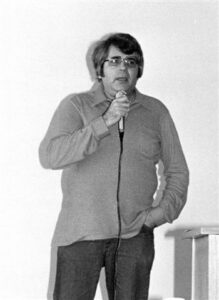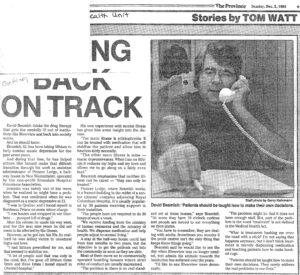MPA at Riverview

This case study centers on the work of MPA at Riverview Hospital, BC’s primary psychiatric care facility for much of the twentieth century. A fascinating illustration of a radical community organization opting to work for change within an institution that they consistently critiqued, the group established and ran a MPA “outpost” at Riverview for several years in the late 1970s. But as this 1973 Nutshell article by Dave Beamish demonstrates, MPA began this work in the tradition of hospital visiting, albeit with critical eye and a patient’s perspective.
With his personal familiarity with Riverview regimes and personnel, Dave proved to be a central figure in MPA’s Riverview projects and spear-headed the establishment of the MPA connection at the institution. The principles of patient self-help and self-determination were key MPA ideas that Dave Beamish used to give purpose to a life undermined by serious mental health issues. Ruminating on the value of MPA in an extensive 1975 Nutshell article, Beamish stressed the importance of friendship, sensible advice rooted in experience, employment options, and safe places to live and hang out. By the time he wrote this piece, Dave was moving beyond the sanctuary offered by MPA, attending Langara Community College and taking a leading role in accompanying groups of MPA members on weekly visits to Riverview – his evident familiarity with Riverview staff, patients and facilities likely making this last work an easy place to gain patient expertise and develop his considerable managerial skills.
Two years later, Dave Beamish and other MPA members had managed to use their hospital-visiting program as a base for negotiating a more permanent presence at Vancouver main psychiatric facility through the MPA Riverview extension project. A patient-run MPA satellite office at Riverview providing programing for hospitalized patients and for those leaving the facility. Using LIP funding for five salaries, MPA elected two Drop-In coordinators, a Housing/Human Resources coordinator, a Secretary/Treasurer and Dave Beamish as Office Coordinator.
Megan Davies and Dave talked about the MPA work at Riverview in a 2010 interview.

A second set of funds allowed for more elected positions, including Alex Verkade as Secretary/Treasurer, and coordinators to assist with patient housing, visiting wards and sitting on Riverview’s newly created patient review panels. MPA interim elections were held at Riverview – a first in the history of the institution – and patient volunteers helped set up a Drop-In space. Reporting on the project to MPA membership through the pages of The Nutshell, Dave Beamish noted that not only had the coordinators and volunteers made many connections with patients, but that hospital staff were referring patients to them for help and coming to accept and appreciate MPA’s presence at Riverview.
By this point Beamish had become engaged with internal patient politics at Riverview Hospital as well. He and ally Fran Phillips became active members of a task committee at Riverview Hospital for a proposed Patients’ Council, likely as MPA representatives.

As detailed in Fran Phillip’s biography, the two friends and colleagues worked with the Riverview Hospital Volunteer Association to establish Pioneer House in New Westminster. Interviewed in 1984 by The Province newspaper, Dave said that he still stressed the principle of democracy as fundamental in mental health care, both within the walls of Riverview and in commercially operated boarding houses where Pioneer residents usually ended up. “Patients,” he argued, “should be taught how to make their own decisions.” Lanny, Fran, Jackie, and likely Hugh, would have agreed with the merit of that remark.
